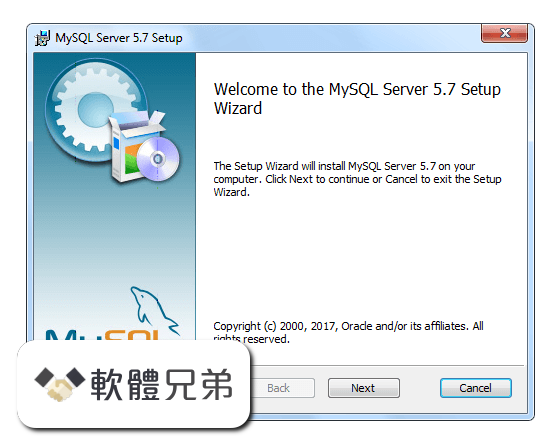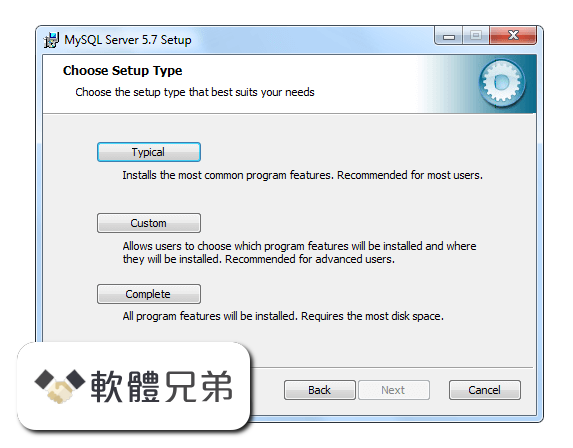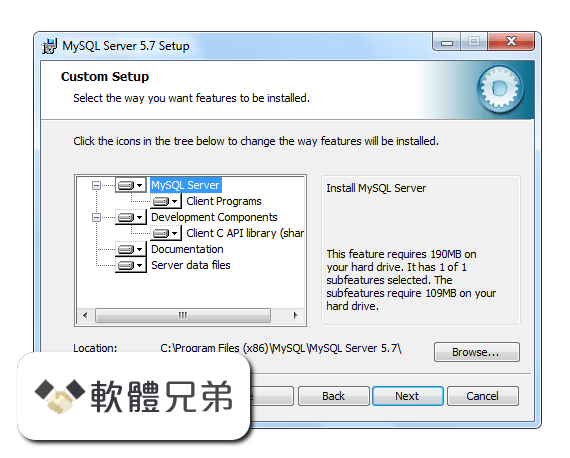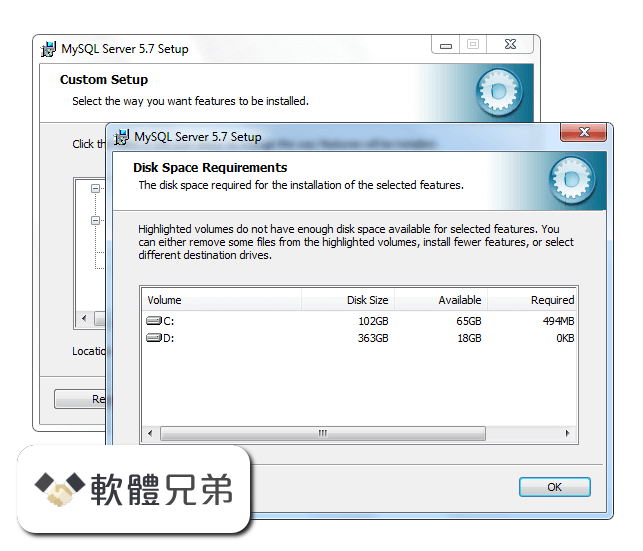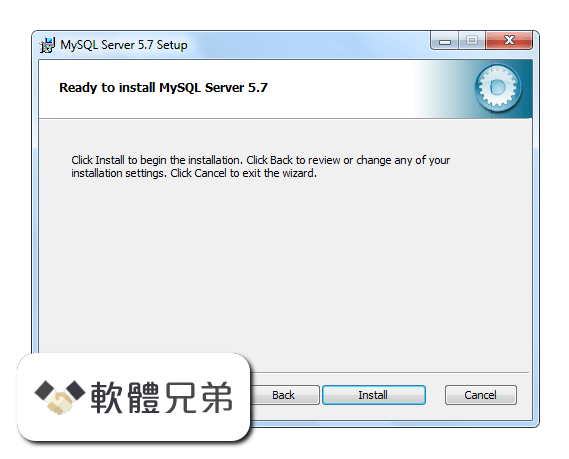|
What's new in this version: Functionality Added or Changed:
- mysql_upgrade now verifies that the server version matches the version against which it was compiled, and exits if there is a mismatch. In addiion, a --version-check option permits specifying whether to enable version checking (the default), or disable checking if given as --skip-version-checking. Bugs Fixed:
- Incompatible Change: When used for an existing MySQL account, the GRANT statement could produce unexpected reults if it included an IDENTIFIED WITH clause that named an authentication plug differing from the plugin named in the corresponding mysql.user table row.
- Because IDENTIFIED WITH is intended for GRANT statements that create a new user, it is now prohibited if the named account already exists.
- Important Change; Replication: When the server was running with --binlog-ignore-db and SELECT DATABASE() returned NULL (that is, there was no currently selected database), statements using fully qualified table names in dbname.tblname format were not written to the binary log. This was because the lack of a currently selected database in such cases was treated as a match for any possible ignore option rather than for no such option; this meant that these statements were always ignored.
- Now, if there is no current database, a statement using fully qualified table names is always written to the binary log.
- InnoDB; Partitioning: Joins involving partitioned InnoDB tables having one or more BLOB columns were not always handled correctly. The BLOB column or columns were not required to be join columns, or otherwise to be named or referenced in the statement containing the join, for this issue to occur.
- InnoDB: In debug builds, an online ALTER TABLE operation that performed a full table copy would raise an assertion. The assertion was due to a race condition that would occur during BLOB retrieval, when applying the table modification log to any log block except for the very last one. This fix modifies row_log_table_apply_convert_mrec() to ensure that an index B-tree lock is acquired to protect the access to log->blobs and the BLOB page.
- InnoDB: When the function trx_rollback_or_clean_recovered() rolls back or cleans up transactions during a crash recovery, it removes the trx objects from the trx_sys list without freeing up the memory used by those objects. To prevent a memory leak, this fix adds trx_free_for_background() calls to trx_rollback_resurrected(), the function that removes the trx objects.
- InnoDB: A missing comma in SHOW STATUS output would break MySQL Enterprise Monitor parsing.
- InnoDB: After a clean shutdown, InnoDB does not check .ibd file headers at startup. As a result, in a crash recovery scenario, InnoDB could load a corrupted tablespace file. This fix implements consistency and status checks to avoid loading corrupted files.
- InnoDB: A memory leak would occur in dict_check_tablespaces_and_store_max_id() when space_id is equal to zero.
- InnoDB: When ADD PRIMARY KEY columns are reordered in an ALTER TABLE statement (for example: ALTER TABLE t1 ADD PRIMARY KEY(a,b), CHANGE a a INT AFTER b), the log apply for UPDATE operations would fail to find rows.
- InnoDB: DML operations on compressed temporary tables would result in a Valgrind error in the buffer manager stack.
- InnoDB: This fix addresses a race condition that would occur between the rollback of a recovered transaction and creation of a secondary index in a locked operation. The race condition would corrupt the secondary index.
- InnoDB: For ALTER TABLE operations on InnoDB tables that required a table-copying operation, other transactions on the table might fail during the copy. However, if such a transaction issued a partial rollback, the rollback was treated as a full rollback.
- InnoDB: Under certain circumstances, LRU flushing would take a long time possibly affecting all flushing activity and causing a shutdown timeout.
- InnoDB: The recv_writer thread would only start after all redo log scans finished. In the case of multiple redo log scans, accumulated redo records would be applied after each scan and before processing the next scan. The absence of the recv_writer thread to help with flushing would slow recovery or result in a server startup timeout. This fix ensures that the recv_writer thread starts before the first scan batch is processed.
- InnoDB: This fix replaces the IB_ULONGLONG_MAX constant with LSN_MAX where the code refers to log sequence numbers, or with TRX_ID_MAX where trx->no is initialized to an undefined value. This change does not alter the value of the constant.
- InnoDB: This fix corrects the text for InnoDB error 6025, which stated, “InnoDB: read can't be opened in ./ib_logfile0 mode.”. The corrected message states, “InnoDB: ./ib_logfile0 can't be opened in read mode.” The variable and mode in the message construct were transposed.
- InnoDB: The page_zip_available function would count some fields twice.
- InnoDB: This fix removes most calls to OS_THREAD_SLEEP from InnoDB.
- InnoDB: Concurrently inserting into a full-text table would cause some inserts to fail. Duplicate values would be generated for full-text search document IDs when performing inserts into a hidden full-text search document ID column.
- InnoDB: FLUSH TABLES FOR EXPORT would sleep too often while flushing pages from buffer pools.
- InnoDB: In cases where threads are forced to do single page flushing, fsync() would be triggered for all data files. This fix allows for synchronous single page flushing.
- InnoDB: In debug builds, an insert would fail with an invalid assertion: sync_thread_levels_g(array, level - 1, TRUE).
- InnoDB: Multiple concurrent calls to dict_update_statistics() would result in unnecessary server load.
- InnoDB: On 64-bit Windows builds, INNODB_BUFFER_POOL_SIZE would not accept an allocation of more than 32GB. This limitation was due to a bug that truncated the internal value for the InnoDB buffer pool size to 32 bits on 64-bit Windows builds.
- InnoDB: Crash recovery would fail with a !recv_no_log_write assertion when reading a page.
- InnoDB: Creating a foreign key constraint using the ALTER TABLE INPLACE algorithm requires foreign_key_checks to be set to 0 (SET foreign_key_checks = 0;). As a result, an appropriate duplicate ID check would not be performed.
- InnoDB: RENAME TABLE would result in a hang due to a MySQL mutex acquisition deadlock.
- InnoDB: DROP DATABASE failed if the database contained an InnoDB table that had a data file in an external data directory. The external data file had an “InnoDB Symbolic Link” file type (.isl) that was not recognized by MySQL. This fix adds .isl as a known InnoDB file type.
- InnoDB: When tables are linked by foreign key constraints, loading one table would open other linked tables recursively. When numerous tables are linked by foreign key constraints, this would sometimes lead to a thread stack overflow causing the server to exit. Tables linked by foreign key constraints are now loaded iteratively. Cascade operations, which were also performed in a recursive manner, are now performed iteratively using an explicit stack.
- InnoDB: When calling the lock_rec_block_validate() function after releasing the kernel mutex, there is a chance the lock might be invalid and result in a Valgrind error due to an invalid read on lock->index. This fix copies the lock->index when the kernel mutex is being held and passes the lock->index to lock_rec_block_validate().
- InnoDB: Under testing, a FLUSH TABLE operation resulted in a timeout due to a missing acknowledgement that the purge thread had stopped.
- InnoDB: For a compressed table, the “page reorganize” function would ignore the innodb_log_compressed_pages option and always log the entire compressed page, which increased the size of the redo log. The “page reorganize” function now adheres to the innodb_log_compressed_pages option and does not log compressed page images to the redo log when innodb_log_compressed_pages is set to “OFF”.
- InnoDB: After disabling foreign key checks with SET foreign_key_checks=0 and performing a DROP INDEX, the table was no longer accessible after restarting the server. This fix allows the table with missing foreign key indexes to be accessed when SET foreign_key_checks=0. When the table is accessible, the user must recreate the missing indexes to fulfill the foreign key constraints.
- InnoDB: When a transaction is in READ COMMITTED isolation level, gap locks are still taken in the secondary index when a row is inserted. This occurs when the secondary index is scanned for duplicates. The function row_ins_scan_sec_index_for_duplicate() always calls the function row_ins_set_shared_rec_lock() with LOCK_ORDINARY irrespective of the transaction isolation level. This fix modifies the row_ins_scan_sec_index_for_duplicate() function to call row_ins_set_shared_rec_lock() with LOCK_ORDINARY or LOCK_REC_NOT_GAP, based on the transaction isolation level.
- InnoDB: Starting mysqld with --innodb_log_buffer_size=50GB failed to allocate memory and returned NULL. For non-debug builds there was no check in place and a segmentation fault occurred. This fix adds a log message stating that memory failed to be allocated, and adds an assertion.
- InnoDB: When UNIV_DEBUG is enabled in debug builds, buf_validate() is often called which sometimes results in false alarms in tests on semaphore wait timeout. This fix increases counter values to reduce false alarms.
- InnoDB: While processing read-write workloads, InnoDB would scan more pages than are required for flushing, unnecessarily consuming CPU resource.
- InnoDB: The explain_filename function, which provides information about a partition by parsing the file name, would return an error when attempting to parse a file name with no partition information.
- InnoDB: Stopping the server, removing a database table (d1.t1) .frm file from the data directory, restarting the server, and dropping the database (d1), would cause an assertion.
- InnoDB: An active FLUSH TABLE FOR EXPORT thread would cause a hang during shutdown. The fix ensures that trx_is_interrupted() is checked during ibuf_merge.
- InnoDB: A multi-row INSERT ... ON DUPLICATE KEY UPDATE insert failure, caused by a duplicate key error, would result in duplicate auto-increment values.
- Replication: Point-in-time recovery could fail when trying to restore a single database from a binary log in row-based format using mysqlbinlog with the --database option.
- Replication: Issuing a FLUSH TABLES statement on a GTID-enabled master caused replication to fail. It was found that this misbehavior was introduced by the fix for Bug #16062608, which disallowed statements that perform an implicit commit but whose changes are not logged when gtid_next is set to any value other than AUTOMATIC. The changes made in that fix have been reverted, and such statements are (again) allowed without regard to the value of this variable.
- Replication: A crash-on-commit error caused InnoDB to lose the previous transaction following execution of a RESET MASTER statement. This occurred because the prepare phase caused a flush to disk, while the commit phase did not perform a corresponding flush within InnoDB.
- To fix this problem, RESET MASTER now causes storage engine logs to be flushed on commit.
- Replication: When used with the options --dump-slave --include-master-host-port, mysqldump printed the port number within quotation marks, as if it were a string value rather than an integer.
- Replication: When processing an Update_rows_log_event or Delete_rows_log_event from the binary log, the before image is hashed and stored in a hash table. Following this, the original table is scanned for the desired records; subsequent processing hashes each record fetched from the original table and performs a lookup for it in the hash table. However, columns read from the image that had originally been set to NULL could instead contain random or “garbage” data, causing the lookup (and thus replication) to fail with an error such as Could not execute Update_rows event on table.
- Replication: Due to time resolution issues on some systems, the time to be taken by the dump thread for a reply from the slave could be calculated to be less than zero, leading to Semi-sync master wait for reply fail to get wait time errors. Since this condition does not have a negative impact on replication, errors caused by these conditions have been reduced to warnings.
- Replication: When one or more GTID log events but no previous GTIDs log events were found in the binary log, the resulting error was mishandled and led to a failure of the server. (This is an extremely rare condition that should never occur under normal circumstances, and likely indicates that the binary log file has somehow been corrupted.) Now in such cases, an appropriate error is issued, and is handled correctly.
- Replication: Running the server with both the --log-slave-updates and --replicate-wild-ignore-table options in some cases caused updates to user variables not to be logged.
- Replication: When using mysqlbinlog and the mysql client to roll forward two or more binary logs on a server having GTIDs enabled, the gtid_next variable was not properly reset when switching from the first to the second binary log, causing processing to halt with an error at that point.
- Replication: The mysqlbinlog options --include-gtids, --exclude-gtids, and --skip-gtids did not work correctly when trying to process multiple files.
- Replication: When the size of an execution event exceeded the maximum set for the buffer (slave_pending_jobs_size_max), row-based replication could hang with Waiting for slave workers to free pending events.
- Replication: Extra binary log rotations were performed due to concurrent attempts at rotation when the binary log became full, which were allowed to succeed. This could lead to the unnecessary creation of many small binary log files.
- Replication: Attempting to execute START SLAVE after importing new slave_master_info and slave_relay_log_info tables failed with an empty error message. Now an appropriate error and message are issued in such cases.
- Replication: Restarting the server after the slave_relay_log_info table had been emptied caused mysqld to fail while trying to return an error.
- Replication: Following disconnection from the master, the slave could under certain conditions report erroneously on reconnection that it had received a packet that was larger than slave_max_allowed_packet, causing replication to fail.
- Replication: An SQL thread error during MTS slave recovery caused the slave to fail.
- Replication: When using the options --read-from-remote-server --stop-never --base64-output=decode-rows --verbose, mysqlbinlog failed to reset the counter used to store the current position within the file when the binary log on the server was rotated.
- Replication: When using mysqldump to back up a database created with MySQL 5.6.4 or an earlier version, setting --set-gtid-purged=AUTO caused the backup to fail, because pre-5.6.5 versions of MySQL did not support GTIDs, and it could not be determined if GTIDs were enabled for the database. This fix makes sure mysqldump does not attempt to output a SET @@global.gtid_purged statement when backing up any pre-5.6.5 databases.
- Replication: Deadlocks could sometimes occur on group commits with a high number of concurrent updates, as well as when one client held a lock from a commit while another client imposed a lock while rotating the binary log.
- Replication: When semisynchronous replication was enabled, the automatic dropping on the master of an event created using ON COMPLETION NOT PRESERVE caused the master to fail.
- Replication: Setting a SET column to NULL inside a stored procedure caused replication to fail.
- Replication: The binary log contents got corrupted sometimes, because the function MYSQL_BIN_LOG::write_cache always thought it had reached the end-of-cache when the function my_b_fill() reported a '0,' while that could also mean an error had occurred. This fix makes sure that whenever my_b_fill() returns a '0,' an error check is performed on info->error.
- Replication: PURGE BINARY LOGS by design does not remove binary log files that are in use or active, but did not provide any notice when this occurred. Now, when log files are not removed under such conditions, a warning is issued; this warning includes information about the file or files were not removed when the statement was issued.
- Replication: When replicating to a BLACKHOLE table using the binary logging format, updates and deletes cannot be applied and so are skipped. Now a warning is generated for this whenever it occurs. Note:
- binlog_format=STATEMENT is recommended when replicating to tables that use the BLACKHOLE storage engine.
- Removing a server RPM package did not shut down the existing server if it was running.
- Overhead for setting PROCESSLIST_STATE values in the Performance Schema THREADS table has been reduced.
- The Windows authentication plugin failed to free a context buffer for each connection.
- The DBUG_PRINT() macro unnecessarily evaluated arguments when debugging was not enabled.
- When index condition pushdown was used on a descending range scan and the first range interval did not contain any qualifying records, the result of the range scan could be empty even if other range intervals contained qualifying records.
- The server could attempt a filesort operation for a zero-size sort length, causing it to exit.
- my_load_defaults() was modified to accommodate some problems under compilation with gcc 4.7.2 that could cause a client crash during option processing.
- Opening a cursor on a SELECT within a stored procedure could cause a segmentation fault.
- SET PASSWORD treated user@'%' and user@'' as referring to the same mysql.user table row.
- Geometry methods that worked with WKB data performed insufficient input data validation, which could cause Valgrind errors or a server exit.
- Some INFORMATION_SCHEMA queries that used ORDER BY did not use a filesort optimization as they did in MySQL 5.5. (Bug #16423536)
- Performance Schema parameter autosizing at startup did not take into account later autosizing changes to other startup parameters on which the Performance Schema parameters depended.
- The WKB reader for spatial operations could fail and cause a server exit.
- Optimizer heuristics inappropriately preferred range access over ref access in cases when the ref access referred to a column of a table earlier in the join seqence.
- Manually-created accounts (using INSERT) with a malformed password effectively had no password.
- Several scripts in the sql-bench directory that were supposed to be executable did not have the executable access bit set.
- For debug builds, DBUG_EXPLAIN resulted in a buffer overflow when the debug system variable value was more than 255 characters.
- Within an XA transaction in ACTIVE state, statements causing an implicit commit could result in metadata locks being released too early.
- Installing Debian packages on Ubuntu 12.10 succeeded using dpkg, but not with Software Center 5.4.1.4.
- For debug builds, with an XA transaction in IDLE or PREPARED status, execution of a query with the query cache enabled could cause a server exit.
- thread_pool_high_priority_connection could not be set at server startup.
- Re-execution of a stored procedure could cause a server exit in Item_field::fix_outer_field.
- A GROUP_CONCAT() invocation containing subquery having an outer reference caused the server to exit.
- With secure_auth enabled, a user with a password that used the pre-4.1 (old) hashing could not update it to use the 4.1 (new) hashing.
- For debug builds, GROUP_CONCAT(... ORDER BY) within an ORDER BY clause could cause a server exit.
- The validate_password plugin did not always enforce appropriate constraints against assigning empty passwords.
- For debug builds, the server could exit for queries involving a nested subquery, a subquery tranformed into a semi-join and using a view.
- The range optimizer could set up incorrect ranges for queries that used XOR operations.
- mysql_secure_installation could not connect to the server if the account used had an expired password. It invoked mysql noninteractively, resulting in that program failing to connect. Now mysql supports a --connect-expired-password option that indicates to the server that it can handle sandbox mode for expired-password accounts even if invoked noninteractively, and mysql_secure_installation invokes mysql with this option.
- If loose index scan was used on a query that used MIN(), a segmentation fault could occur.
- If multiple statements were sent in a single request, the audit log plugin logged only the last one. Now it logs each statement separately.
- For debug builds, an assertion was incorrectly raised for queries executed using eq_ref access and filesort.
- An outer join between a regular table and a derived table that is implicitly groups could cause a server exit.
- A prepared statement that used GROUP_CONCAT() and an ORDER BY clause that named multiple columns could cause the server to exit.
- Creating a FEDERATED table without specifying a connection string caused a server exit. ORDER BY MATCH ... AGAINST could cause a server exit.
- Client programs from MySQL 5.6.4 and up could confuse older servers during the connection process by using newer protocol features not understood by older servers.
- When a partition is missing, code in ha_innodb.cc would retry 10 times and sleep for a microsecond each time while holding LOCK_open. The retry logic for partitioned tables was introduced as a fix for Bug#33349 but did not include a test case to validate it. This fix removes the retry logic for partitioned tables. If the problem reported in Bug#33349 reappears, a different solution will be explored.
- The mysql.server script exited with an error if the status command was executed with multiple servers running.
- Use of the VALUES() function in the VALUES() clause of an INSERT statement could result in Valgrind warnings or an unstable server, possibly leading to a server exit.
- In some cases, REVOKE could fail to revoke the GRANT OPTION privilege.
- The mysql client allocated but did not free a string after reading each line in interactive mode, resulting in a memory leak.
- Killing a connection while it was in the process of disconnecting could lead to an assertion being raised, Valgrind warnings, and general unstability.
- INSERT ... ON DUPLICATE KEY UPDATE on a view could cause a server exit. (Bug #14261010)
- Grouping by an outer BLOB column in a subquery caused a server exit.
- The server could exit due to improper handling of the error from an invalid comparison.
- The CMake check for unsigned time_t failed on all platforms.
- mysqladmin debug causes the server to write debug information to the error log. On systems that supported mallinfo(), the memory-status part of this output was incorrect in 64-bit environments when mysqld consumed more than 4GB memory.
- Now the server uses malloc_info() to obtain memory-status information. malloc_info() does not report the memory that the glibc malloc() implementation internally allocates using mmap(). However, it does provide the memory usage information in all the memory arenas.
- This bug fix also involves a change of output format. The server now writes memory information in XML format rather than as plain text.
- The mysql client incorrectly used latin1 for certain comparisons even if started with a multibyte default character set, resulting in a client crash.
- The url columns in the mysql datatbase help tables were too short to hold some of the URLs in the help content. These columns are now created as type TEXT to accommodate longer URLs.
- mysqld --help and mysqld --verbose --help performed unnecessary logging.
- InnoDB does not support full-text parser plugins, but failed to report an error if they were specified. Now an ER_INNODB_NO_FT_USES_PARSER error is returned.
- If Loose Index Scan was used to evaluate a query that compared an integer column to an integer specified as a quoted string (for example, col_name = '1'), the query could return incorrect results.
- IF() function evaluations could produce different results when executed in a prepared versus nonprepared statement.
- If a function such as AES_DECRYPT() that requires SSL support failed, the error could affect later calls to functions that require SSL support.
- In a MySQL server newer than MySQL 5.5 using a nonupgraded mysql.user table (for which mysql_upgrade had not been run), statements to set passwords caused a server exit due to a faulty check for the password_expired column.
- It is now possible to suppress installation of the mysql-test directory after compiling MySQL from source by invoking CMake with the INSTALL_MYSQLTESTDIR option explicitly set to empty:
- cmake . -DINSTALL_MYSQLTESTDIR=. Previously, attempts to do this resulted in an error.
- When only counting events but not timing them, Performance Schema would report MIN_TIMER_WAIT values as a large number instead of 0.
- Using range access with an index prefix could produce incorrect results.
- For debug builds, metadata locking for CREATE TABLE ... SELECT could raise an assertion.
- A new CMake option, WITH_EDITLINE, is provided to indicate whether to use the bundled or system libedit/editline library. The permitted values are bundled (the default) and system.
- WITH_EDITLINE replaces WITH_LIBEDIT, which has been removed.
- When specified in an option file, the plugin-dir client option was ignored.
- Indexes on derived tables that were used during the first invocation of a stored procedure were not used in subsequent invocations.
- For DELETE and UPDATE statements, EXPLAIN displayed NULL in the ref column for some cases where const is more appropriate.
- The optimizer could choose a poor execution plan for queries with ORDER BY ... LIMIT.
- FOUND_ROWS() could return an incorrect value if the preceding query used filesort
MySQL 5.6.12 (32-bit) 相關參考資料
Converting MySQL 5.6.10 - 32 bit to 64 bit version
2013年10月10日 — I am currently using MySQL DB Version 5.6.10 for 32 bit running in 64 bit Window OS.I want to change it to 64 bit without taking any dump.
https://stackoverflow.com
Download MySQL Community Server (Archived Versions)
8.0.32, 8.0.31, 8.0.30, 8.0.28, 8.0.27, 8.0 ... 5.6.12, 5.6.11, 5.6.10, 5.6.9 rc, 5.6.8 rc, 5.6.7 rc ... Linux - Generic (glibc 2.28) (x86, 64-bit), Compressed TAR ...
https://downloads.mysql.com
Download MySQL Installer (Archived Versions)
To download the latest release of MySQL Installer, please visit MySQL Downloads. Product Version: 8.0.36, 8.0.35, 8.0.34, 8.0.33, 8.0.32 ... 5.6.12, 5.6.11, 5.6.
https://downloads.mysql.com
Downloading MySQL 5.6.12 (32-bit) from FileHorse.com
MySQL is an open-source, community-driven RDBMS that provides a robust and scalable platform for storing, managing, and retrieving data.
https://www.filehorse.com
MySQL 5.6.12 (32-bit) Download
2013年6月5日 — Download MySQL 5.6.12 (32-bit) for Windows PC from FileHorse. 100% Safe and Secure ✓ Free Download 64-bit Software Version.
https://www.filehorse.com
MySQL 64bit server with 32bit libmysql.dll
2013年7月25日 — I have instalated on a new server hardware MySql 5.6.12 64bit server which I wish to use as database engine for my Hmailserver.
https://www.hmailserver.com
MySQL :: Download MySQL Community Server (Archived ...
8.0.32, 8.0.31, 8.0.30, 8.0.28, 8.0.27, 8.0.26, 8.0.25, 8.0 ... 5.6.12, 5.6.11, 5.6.10, 5.6.9 rc, 5.6.8 rc, 5.6.7 rc ... Linux - Generic (glibc 2.5) (x86, 32-bit), ...
https://downloads.mysql.com
MySQL Installer - (Archived Versions)
To download the latest release of MySQL Installer, please visit MySQL Downloads. Product Version: 8.0.36, 8.0.35, 8.0.34, 8.0.33, 8.0.32 ... 5.6.12, 5.6.11, 5.6.
https://downloads.mysql.com
System requirements for MySQL
32/64Bit. 5.5, Community, x86 32-bit. x86 64-bit. Standard, x86 32-bit. x86 64-bit ... Windows 2012 Standard Edition 64 Bit. MySQL Server 5.6.12 Community Edition ...
https://docs.microfocus.com
|
